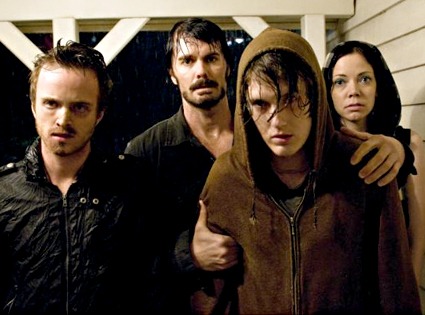 Rouge Pictures
Rouge PicturesReview in a Hurry: The latest remake of an old story, in which escaped criminals unknowingly seek shelter at the home of their latest victim's parents, The Last House on the Left wallows in sick sadism while missing the point completely.
The Bigger Picture: Beware, teenage girls, if you try to score some drugs without telling your parents, you will be raped and murdered! But if it's any consolation, your parents will then torture those responsible to death. Such is the essential storyline of the 1972 version of The Last House on the Left, and with minor modifications, this one too.
The rape-and-revenge movie is the ugly bastard stepchild in the family tree of horror—at best, it can be an artful indictment of all humanity (Gaspar Noé's Irreversible); at worst, the misogynist indulgence of a demented director's nasty fantasies (David DeFalco's Chaos).
And yet, the basic story has been part of human culture for centuries—The Last House on the Left may be most immediately based on Wes Craven's directorial debut, but that in turn was a loose remake of Ingmar Bergman's 1960 film The Virgin Spring, which itself was adapted from a medieval ballad, so obviously we remain fascinated by the tale. Yet what Craven and Bergman understood that the latest director Dennis Iliadis does not, is that the story is fundamentally anti-violence—the sympathetic father figure becomes somewhat horrific himself when in the throes of vengeance.
Iliadis also seems uninterested in larger themes: Where Bergman questioned the nature of God and Craven inserted some off-kilter social satire, all we have here is the brutality, amped-up so that every punch landed will make you wince.
Not to spoil any more than the film's trailer already has, but, though the carnage is more graphic than ever before, the body count is also lower, allowing for an attempt at a cop-out "happy" ending of sorts. But when a movie so punishes the audiences in the first half that they cheer for graphic torture in the second, it'd be nice if the story actually stopped to consider the morality of such, if only for a moment.
The 180—a Second Opinion: Taken purely on its own terms, the movie succeeds at everything it sets out to do: The acting and cinematography are tops, and the violence brutal. But unless you're a masochist, the result is no fun at all (and this is coming from a fan of the Saw and Hostel movies).